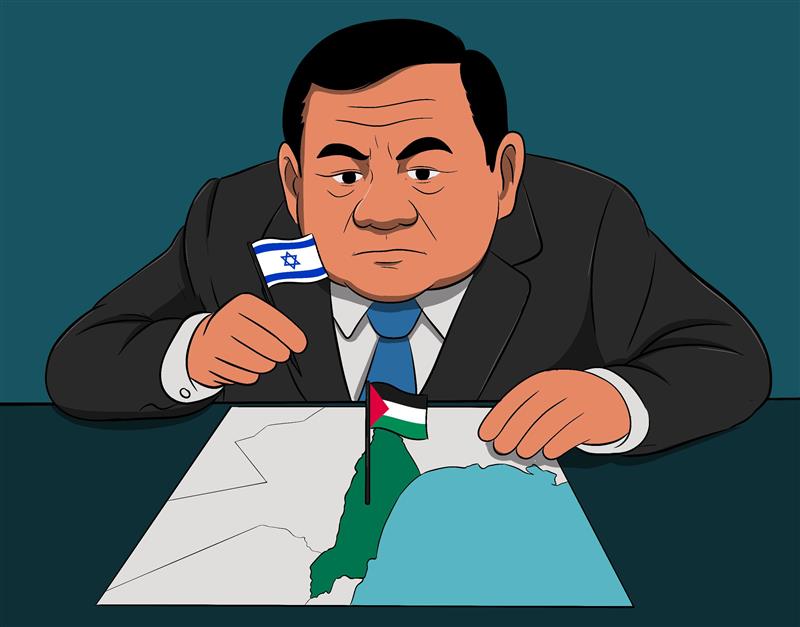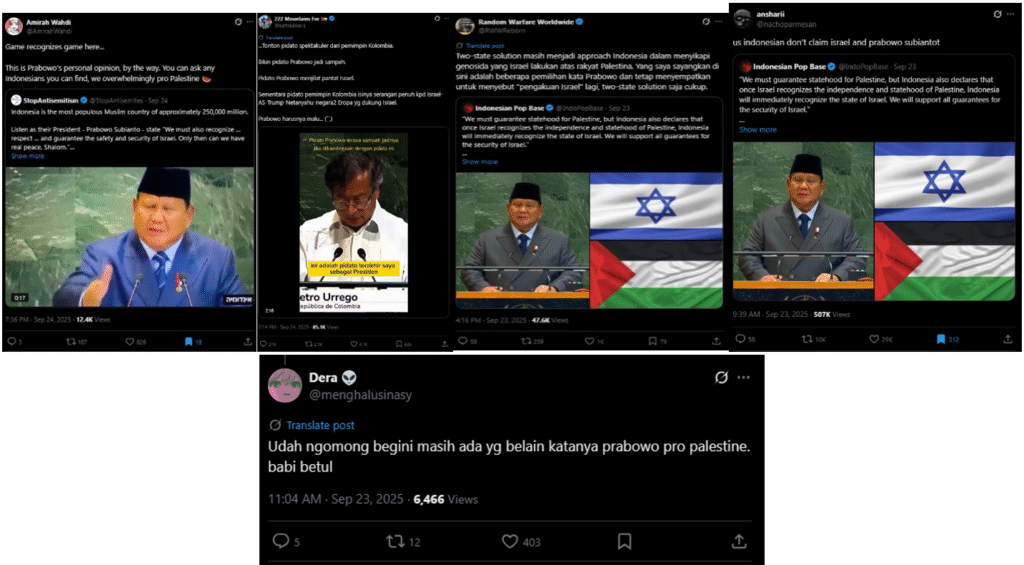Pandji’s New Chapter of Comedy
Freedom of opinion and expression is a constitutional right protected by law. Today, the public’s channel for voicing disappointment toward…

President of Indonesia Prabowo Subianto reiterated Indonesia’s support for Palestinian independence and the implementation of a two‑state solution. He delivered this message at the High‑Level International Conference for the Peaceful Settlement of the Question of Palestine and the Implementation of the Two‑State Solution held at the United Nations Headquarters in New York on Monday, 22 September 2025.
The conference was co‑chaired by French President Emmanuel Macron and Saudi Foreign Minister Faisal bin Farhan Al Saud. Other prominent figures in attendance included UN Secretary‑General António Guterres, General Assembly President Annalena Baerbock, and Palestinian President Mahmoud Abbas, who joined virtually from Ramallah.
In his speech, Prabowo expressed deep concern over the ongoing humanitarian tragedy in Gaza. He highlighted the thousands of deaths—many women and children—and the growing threat of hunger. Prabowo stressed Indonesia’s commitment to promoting a two‑state solution, calling it the only path to peace for Palestine. While urging the international community to recognise Palestinian sovereignty, he added that Indonesia would recognise Israel if it first recognised Palestinian independence. Prabowo even said Indonesia would support all guarantees for Israel’s security, emphasising that true peace must benefit all sides.
As a sign of commitment, Prabowo said Indonesia was ready to participate in maintaining world peace, including by sending peacekeeping troops if needed.
At first glance, Indonesia’s presence and Prabowo’s speech suggested clear support for Palestinian sovereignty. Yet controversy arose when he said Indonesia was willing to recognise Israel once it recognised Palestinian independence:
“We must guarantee statehood for Palestine, but Indonesia also declares that once Israel recognizes the independence and statehood of Palestine, Indonesia will immediately recognize the State of Israel and we will support all guarantees for the security of Israel.”
The statement triggered public reaction because Indonesia’s long‑standing policy has been unconditional support for Palestine and non‑recognition of Israel. Many saw his remarks as a compromise and a softening toward Israel.
Moreover, Prabowo avoided using terms like “genocide” when discussing atrocities in Gaza. Instead he chose phrases such as “unbearable tragedy in Gaza” and “human catastrophe is unfolding before our eyes,” whereas activists frequently use “genocide” to describe Israeli actions.

Indonesian netizens voiced disappointment widely. On X (formerly Twitter), user @menghalusinasy sarcastically noted that some people still called Prabowo pro‑Palestinian after his remarks. User @RWWRReborn criticized Prabowo for mentioning recognition of Israel when simply backing a two‑state solution would suffice.
A harsher critique came from @kafirradikalis, who compared Prabowo’s speech to that of Colombian President Gustavo Petro. In their view, Petro was bolder in condemning Israel and its supporters, while Prabowo seemed to “lick Israel’s boots.” User @AmirahWahdi asserted that Prabowo’s view was his personal opinion and not representative of the Indonesian people, who largely support Palestine.
This sentiment aligned with a Survey Media Nasional (Median) poll conducted from 8 to 13 September 2025 among 907 respondents in 38 provinces. The survey found that 78.6% opposed opening diplomatic ties with Israel, 12.4% supported it, and 9% were undecided. Conducted via Google Forms, the survey underscored Indonesia’s strong public support for Palestine and resistance to normalizing relations with Israel.
Prabowo’s statements also caught the attention of Israeli media. The Jerusalem Post reported on his readiness to send 20,000 peacekeepers to Gaza and his emphasis on respecting Israel’s right to security. The Times of Israel similarly highlighted his pledge to ensure Israel’s security and noted that Indonesia currently has no diplomatic ties with Israel. American‑based anti‑antisemitism account @StopAntisemites shared a clip of Prabowo’s speech, praising his willingness to recognise Israel, inadvertently creating the impression that his remarks legitimized Israel and Zionism.

Prabowo’s approach reflects a manoeuvre to uphold Indonesia’s moral values on Palestine while remaining pragmatic amid global politics. His conditional recognition of Israel is a strategic bargaining chip: Indonesia would consider recognizing Israel only if Israel first recognized Palestinian statehood. Recognition thus becomes a political tool rather than a purely legal matter.
As the world’s largest Muslim‑majority country without diplomatic ties to Israel, Indonesia’s conditional stance is unique. It signals a shift in handling Israel—no wonder Israeli media spotlighted it as Prabowo’s affirmation of Israel.
His emphasis on security for both sides suggests peace must be mutual. This inclusive, constructive approach implies Palestine and Israel must both cease fighting to achieve a guaranteed peace.
Domestically, Prabowo’s two‑sided approach provoked strong reactions on social media. Many Indonesians ridicule their president because Israel is widely seen as the main threat to Palestinian peace. Gaza’s suffering is seen as proof of Israeli aggression; Israel is viewed as uninterested in peace but in annexation.
Prabowo’s reluctance to label events in Gaza as “genocide” and his preference for “human tragedy” underscore his avoidance of direct confrontation with Israel and its allies—an effort to keep Indonesia from being isolated globally. Yet this ambiguity leaves Indonesia flexible but risks losing direction in the international arena and could be seen at home as betraying long‑held principles.

According to Socindex, the mix of keywords “prabowo,” “palestina,” and “israel” on X from 22–25 September 2025 produced 137,920 engagements from 3,187 posts by around 2,000 authors. Most reactions were “applause” (103,113). Audience reach for related posts was 941,829, indicating broad reach and high interaction.

Engagement surged sharply from 22 September and peaked on 24 September with 68,114 interactions before dropping significantly on 25 September. This pattern shows a short‑lived spike that failed to sustain momentum.

The majority of content was generated by human accounts (1,016 tweets), followed by cyborg accounts (719) and bots (283). This suggests discussions about Prabowo’s speech were largely organic, though some automation amplified the trend.

Tweets critical of Prabowo led the list of monitored posts. International accounts such as StopAntiSemitism, No Front Militar, and Loay Alshareef amplified Prabowo’s message.

Newstensity recorded that news coverage of Prabowo’s UN speech peaked on 23 September 2025 with 3,049 articles, then declined in following days—signaling a rapid rise and fall in media attention.

Detik.com led coverage with 186 articles, followed by Kompas.com (121), Tribunnews.com (75), Antara News (74) and Merdeka.com (67). High output from major online outlets shows the topic’s wide reach.
President Prabowo’s UN speech on Palestine reflects a shift in Indonesia’s diplomacy regarding the Palestine–Israel conflict. His pragmatic tone and softer stance toward Israel drew praise from some quarters but disappointment from many Indonesians who support Palestinian freedom. The approach tests Indonesia’s long‑standing principle of unconditional support and uncompromising opposition to Israel. Prabowo must show that his new strategy will indeed promote peace in Palestine rather than empty rhetoric.
Writer: Indra Buana (Jangkara), Ilustrator: Aan K. Riyadi
Freedom of opinion and expression is a constitutional right protected by law. Today, the public’s channel for voicing disappointment toward…
In January 2026, the internet was shaken by the viral spread of a book titled “Broken Strings: Fragments of a…
The government has begun outlining the direction of the 2026 State Budget (APBN 2026) amid ongoing global economic uncertainty. Finance…
The Indonesian government, through the Ministry of Communication, Information, and Digital Affairs (Komdigi), has officially temporarily blocked the use of…
A few years ago, electric cars still felt like a far-off future. They were seen as expensive, futuristic in design,…
Hydrometeorological disasters hit three provinces in Sumatra—Aceh, North Sumatra, and West Sumatra. Tropical Cyclone Senyar, spinning in the Malacca Strait,…
The heavy rainfall in late November 2025 caused flash floods that submerged parts of Aceh, West Sumatra, and North Sumatra….
When we consider people’s decisions today—what to buy, what issues to trust, and which trends to follow—one thing often triggers…
Finance Minister Purbaya Yudhi Sadewa underscored the government’s uncompromising stance against illegal used-clothing imports, which he stated have harmed the…
Over the past month, Indonesia’s political elites, economists, and the general public were stirred by a statement from Finance Minister…